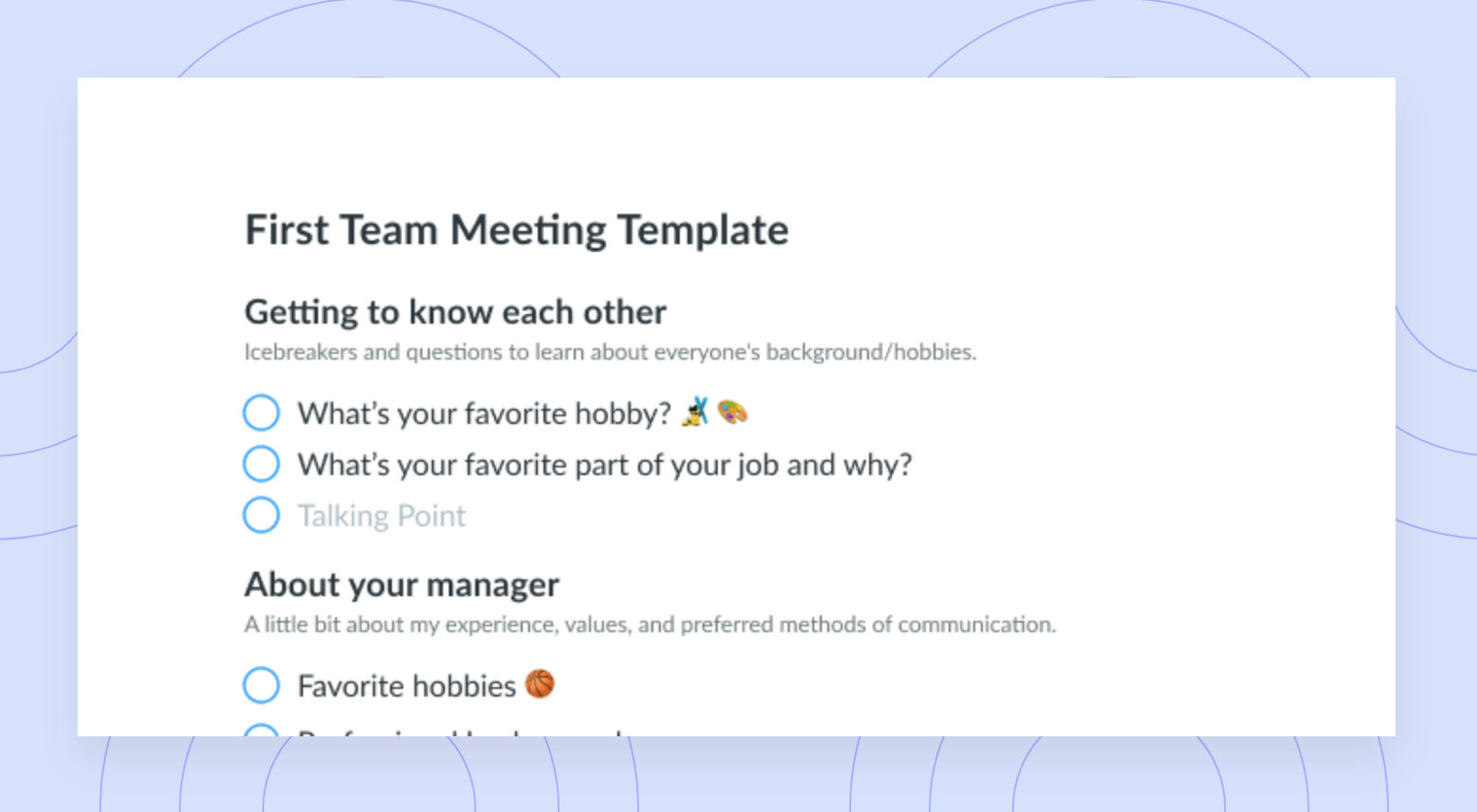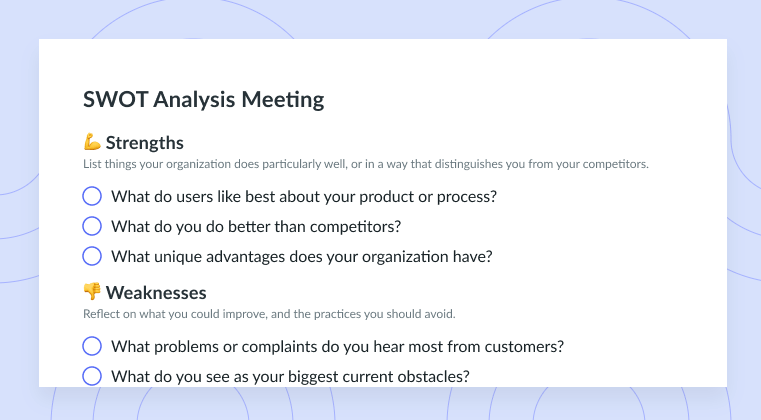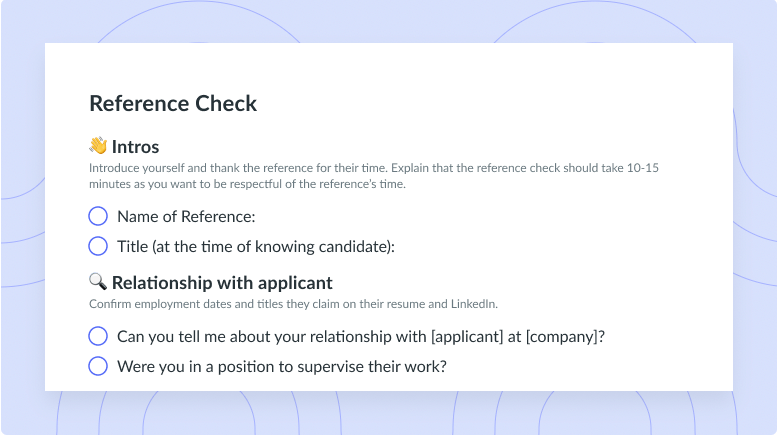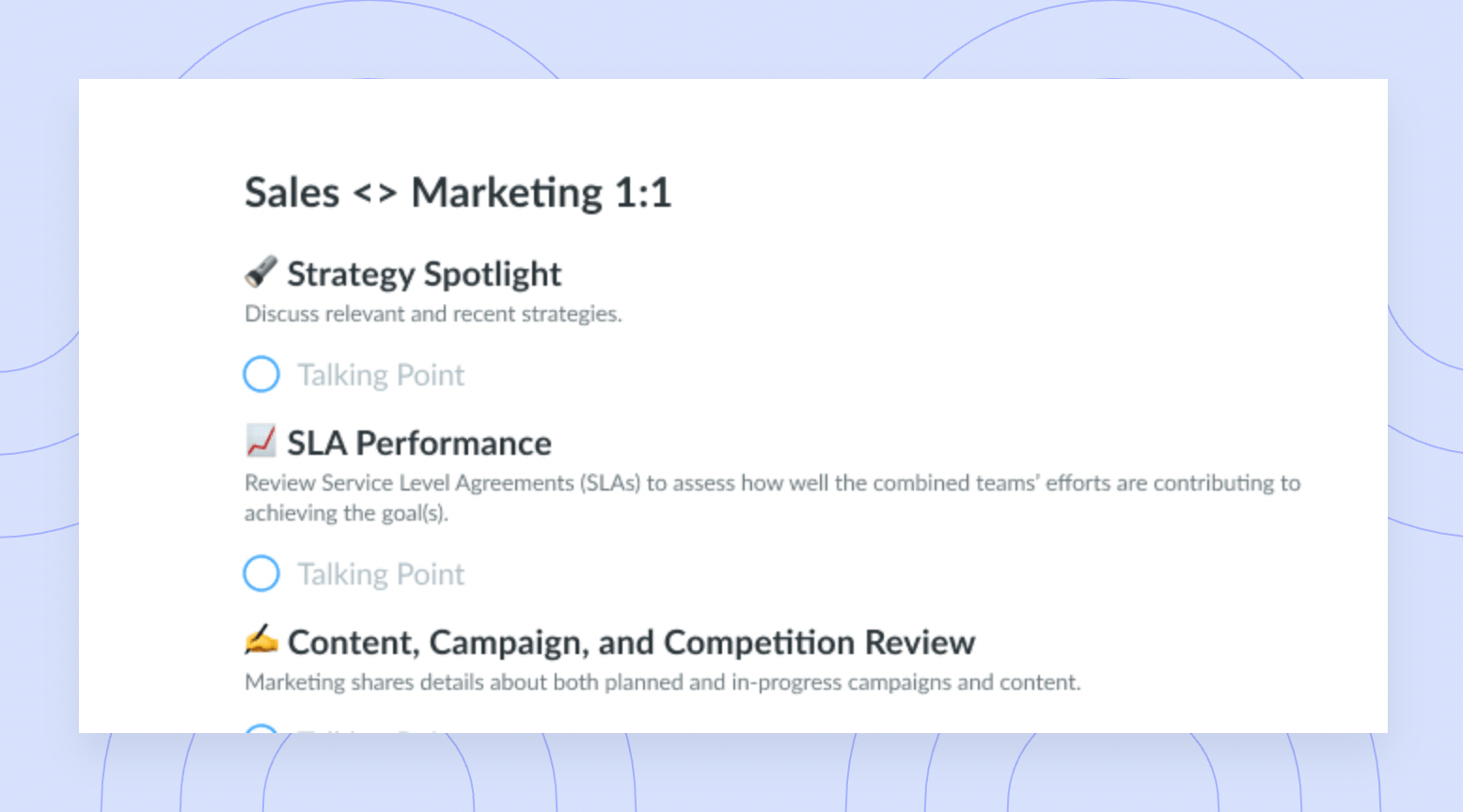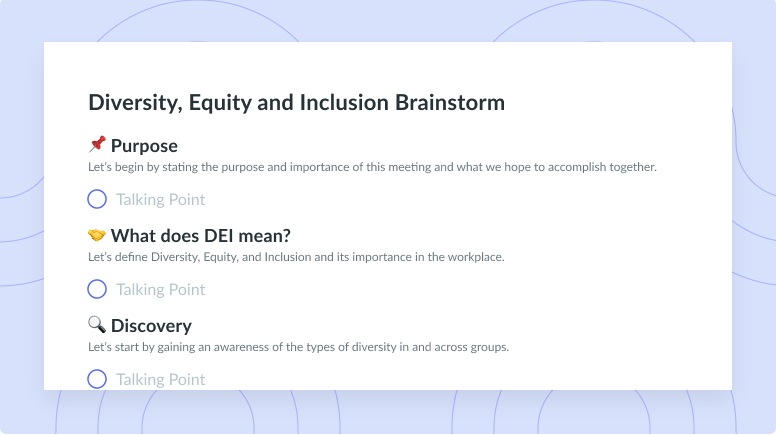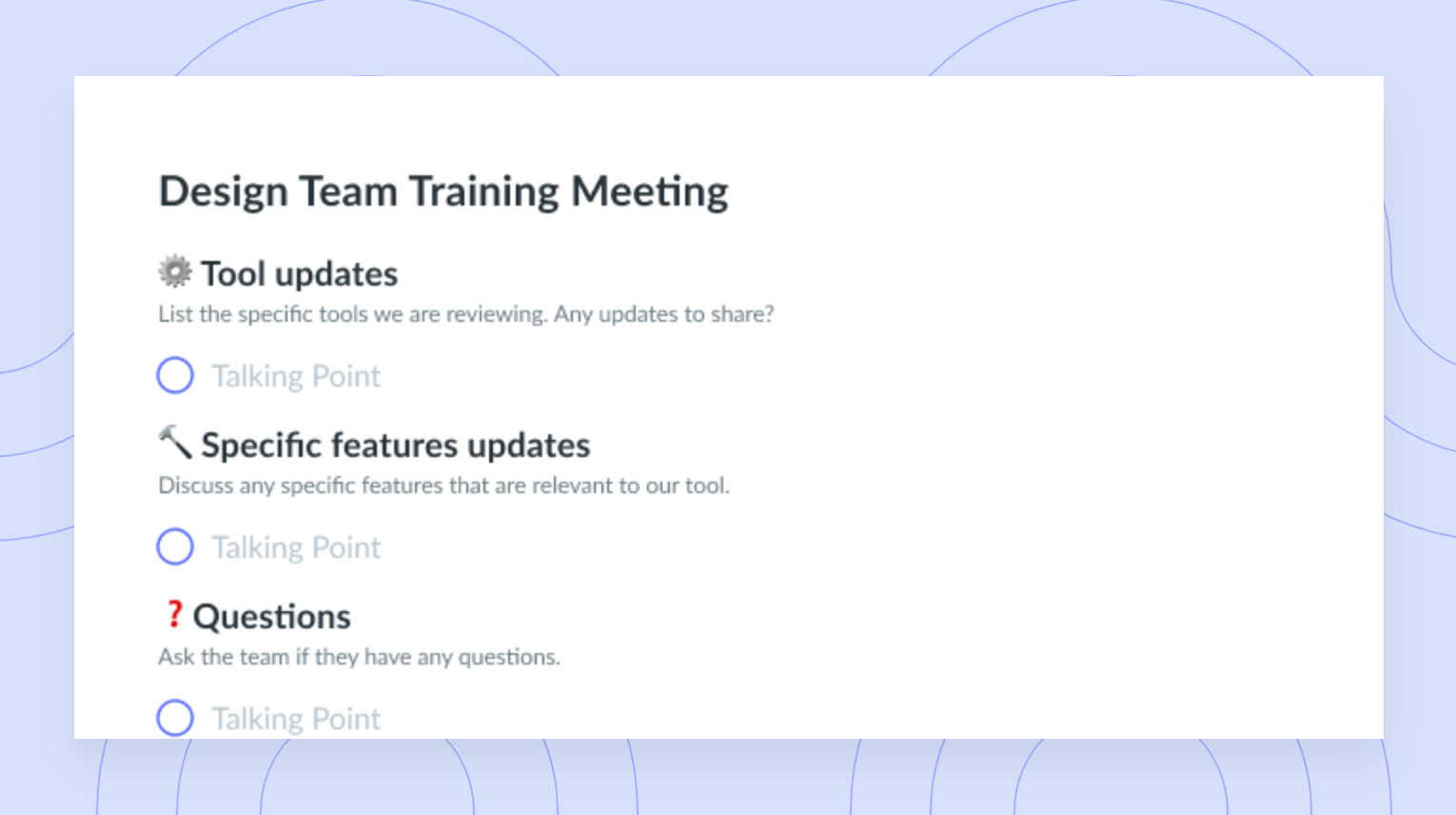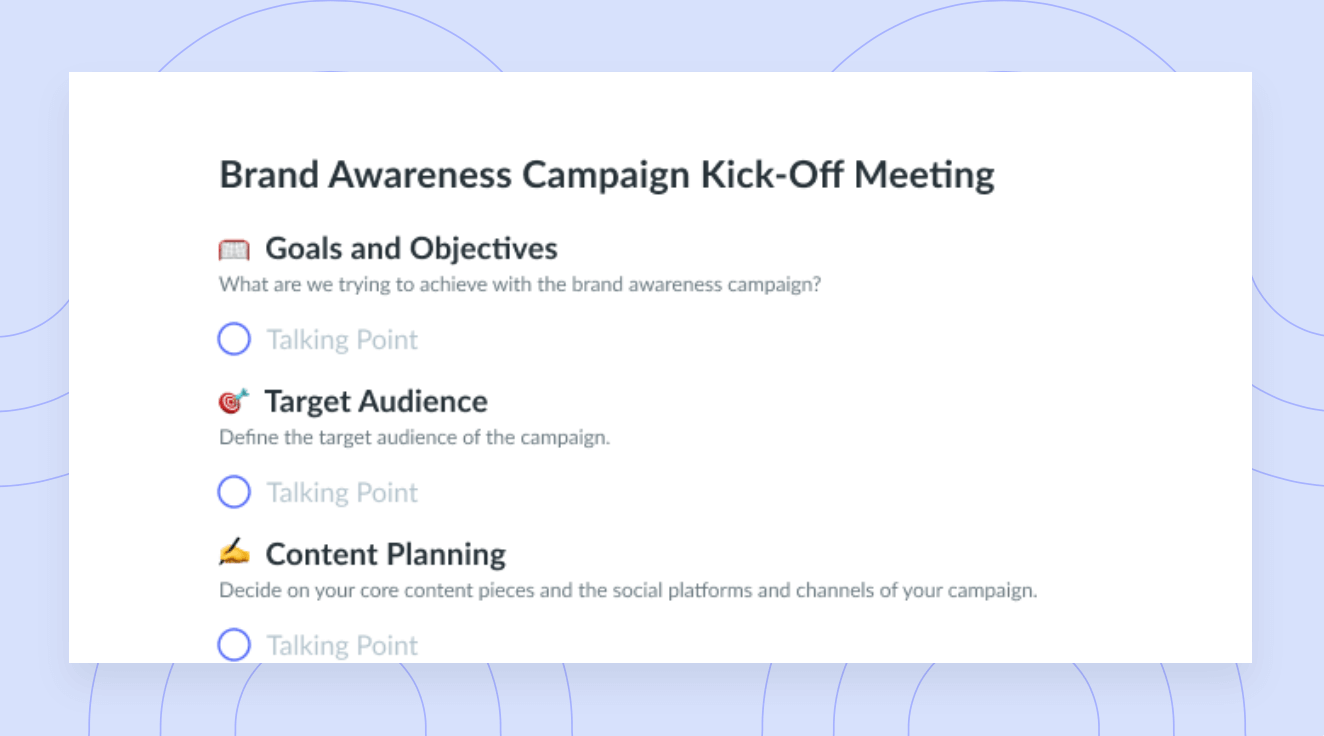Self-Awareness: 7 Ways to Develop It + the Benefits
Observe your emotions and behaviors as you lead a more conscious life in and outside of the office by developing self-awareness skills.
Self-awareness is a skill that can be continuously grown in both your personal and professional life. It’s an especially important skill for leaders to cultivate to be effective and influential. When people are more aware of themselves, they become more aware of how to best behave in various environments and situations. The ability to observe your own behavior from the inside out will help you monitor your own emotions and also have a strengthened ability to tend to your mental health. Like any other skill, self-awareness can be improved with consistent practice and the right tools. If you want to develop self-awareness skills and cultivate a conscious leadership style, this is the perfect article for you.
- What is self-awareness?
- How important is self-awareness for leaders?
- Examples of self-awareness skills
- Ways to develop self-awareness skills
What is self-awareness?
Self-awareness involves paying attention to and monitoring your feelings and reactions and is a skill that can be taught, practiced, and built over time. As such, you can take a deeper look at your emotions to better understand what has triggered you to feel a certain way and how these feelings can be turned into the most appropriate and healthy reactions possible. Being self-aware means you’re more aligned with your strengths, weaknesses, triggers, motivators, and other traits.
Once you’re self-aware, this awareness also transcends beyond yourself and allows you to better understand your team and lead based on these strengths, weaknesses, and opportunities. Self-awareness is important because it allows you to react in the best way possible and provides valuable insights about yourself and your team.

Develop self-awareness skills with regular 1:1s
A well-run one-on-one can foster communication and collaboration by including an agenda both people can contribute to. Try using a tool like Fellow to start developing self-awareness!
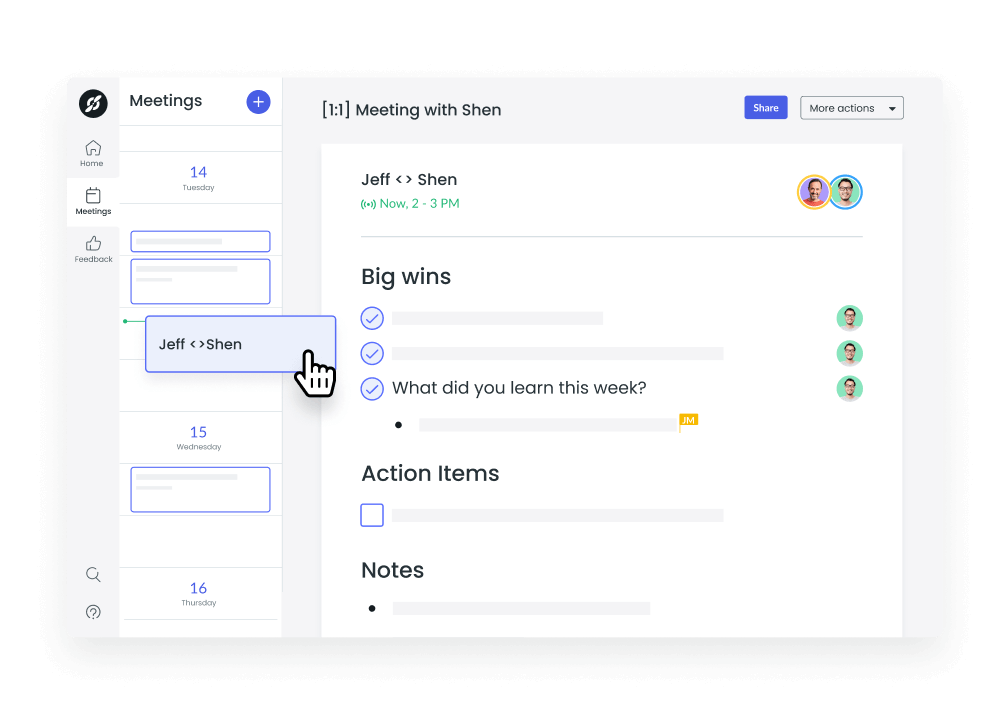
How important is self-awareness for leaders?
Self-awareness is crucial for leaders because having it minimizes instances of arrogance and ignorance. The ability to behave appropriately in various professional scenarios is extremely important, as is the ability to manage intense feelings that may arise. Being self-aware as a leader is also important because you set an example for many other people who look up to you. Not only are self-aware leaders more personable, but they’re also better able to manage difficult situations and act as a voice of reason.
Examples of self-awareness skills
1Empathy
Being more self-aware means that you’ll grow your emotional intelligence and be better able to relate to others in various types of situations. This is because your self-awareness extends beyond yourself and makes you more aware of what others may be going through.
2Confidence
In knowing yourself better through improved self-awareness, you’ll feel more confident because you’ll be much more aware of your strengths, weaknesses, needs, and triggers. Being vulnerable with yourself and with your team will make you a more confident leader.
3Mindfulness
Mindfulness is a state of active, open attention to the present. This state is described as viewing one’s thoughts and emotions without judging them as good or negative. When you work on your self-awareness, you not only become more aware of yourself but you also become more aware of your surroundings. Having the ability to remain in the present moment is good for your mental health because you can eliminate the anxiety or stress related to thinking about situations that have already happened or what may happen in the future.
4Patience
Self-awareness can help people practice patience because it requires thinking about your reactions and then acting in the most productive and appropriate way. As such, while you may want to yell at someone for a huge mistake, practicing self-awareness will teach you to think before you react so you can choose more appropriate behaviors.
5Kindness
Cultivating more empathy and patience as a result of your enhanced self-awareness will also make you a kinder person. Being self-aware means looking outside of yourself to understand how others are feeling and then acting in the nicest and most empathetic way that you can.
7 ways to develop self-awareness skills
- Take responsibility
- Ask for feedback
- Learn how to turn feedback into action
- Practice mindful habits
- Track your goals and priorities
- Learn new skills
- Set aside time for reflection
1Take responsibility
No one is perfect, and whether you’re a leader or not, everyone makes mistakes. It’s important that when you do slip up in any way, you take responsibility. This is a prime example of self-awareness because you have the ability to reflect and acknowledge that you made a mistake or could have acted in a more appropriate way. When leaders aren’t afraid of showing their more human side to their employees, they will be more relatable and better respected. In setting this example, when other team members make a mistake they’ll feel more inclined to take responsibility too, thus enhancing honesty and trust within the entire group.
2Ask for feedback
Asking for feedback is another great way to build your self-awareness. A healthy and strong work culture begins with giving and receiving feedback. With Fellow, you and your team can share real-time feedback on meetings, projects, and performance so you’re constantly reflecting on your performance and on how you’re feeling at work. A recent article by the Harvard Business Review shares that feedback is essential for building self-awareness:
“In addition to informally and periodically asking friends and family, use the formal processes and mechanisms at your workplace. If none are in place, see if you can implement more formal feedback loops. Provided it is done well, constructive, formalized feedback allows us to better see our own strengths and weaknesses.”
Try this free meeting agenda template to get valuable feedback in your one-on-ones:
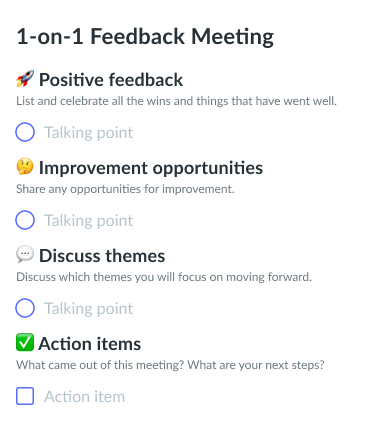
3Learn how to turn feedback into action
It’s important to ask for feedback, but it’s even more important to put it into action—otherwise, what’s the point? Ensure that you’re documenting the feedback you receive so you can actively work towards improving in particular areas. Feedback allows you to focus on the introspective process of your day to day duties. One way you can turn your feedback into action items is by tracking tangible tasks you can do. With Fellow, you can also use the action items tool to track your responsibilities and tasks so you can remain on track to complete them. This way, you’re consciously turning your feedback into smaller tasks that will eventually bring you to achieve the larger overarching goal.
“One of the favourite questions I have when I first start working with somebody is no aid and at some point, I’m going to have to give you feedback. This is how I like to get feedback. How do you like to get feedback, if you can set that clarity right from the very beginning, when I have to give you feedback, I’m going to mirror what you said to me six months earlier. “
– Heidi Hauver, Vice President, People Experience at ShinyDocs
4Practice mindful habits
Practicing mindful habits like simply slowing down and focusing on your breathing, journaling, or meditating are all hugely beneficial for building self-awareness. It’s extremely helpful to take a break from the various external stimuli that exist in our everyday lives and tune into how we’re feeling, what kinds of thoughts are crossing our minds, and how our bodies feel physically. Practicing mindfulness habits can also bring you a different perspective around work. The same insightful article from the Harvard Business Review, speaking on meditation, states:
“As most people know by now, meditation is the practice of improving your moment-by-moment awareness. Most forms of meditation begin with focusing on, and appreciating the simplicity of, inhaling and exhaling. But these don’t need to be formal or ritualistic — greater clarity can also come from regular moments of pause and reflection.”
5Track your goals and priorities
If you don’t take the time to write down and track your goals and priorities, they become much more difficult to achieve. In fact, a key to developing self-awareness is by tracking these personal goals that you set for yourself. You can easily track your goals with Fellow’s Streams tool, where you can organize your ideas in a way that’s productive and makes sense to you. Streams are digital notepads where action items and ideas come together to inspire your productivity. Whether you’re using Streams in Fellow or writing your progress in a journal, use something so you have a historical record of your progress and achievements.
6Learn new skills
Trying different things is another great way to build self-awareness. Learning new skills is the perfect way to assess what you like, what you don’t like, and where your strengths and weaknesses lie. Getting out of your comfort zone is especially important if you feel like you’re getting bored or feeling stagnant in your current position. You may surprise yourself and find a new passion that could change the entire direction of your career. Learning is a great way to get to know yourself better and is also beneficial for your professional development, so you have nothing to lose by trying something different.
“Stay open minded, keep learning, listen to your people. Even if you’re learning stuff that has nothing to do with management, you’re gonna go into work every day, and you’re going to be more energetic, open, positive and fun. I think the act of always learning is a very powerful one.”
– Camille Fournier, Managing Director of Platform Engineering at Two Sigma.
7Set aside time for reflection
Setting aside some time for reflection is hugely important for developing self-awareness skills. Engaging in self-reflection as a leader can help you be more creative, generate more positive energy, cultivate motivation, and become more open-minded and accepting. The more you know yourself, the more you feel aligned with your team and with your mission, thus benefiting the success of the organization. In fact, studies have shown that taking time to self-reflect positively improves job performance.
Parting advice
Developing self-awareness skills is something you can work on for the duration of your career and for the entirety of your life. Working on your self-awareness is the key to good leadership, so long as you’re equipped with the right tools, resources, and knowledge. The important difference between being self-conscious and being self-aware is that the former is critical while the latter is not. To become more self-aware, it’s important to be non-judgemental towards ourselves and others, which means letting go of any critical outlook. Working on becoming more self-aware means being kind to your mind, paying attention to your mental health, and setting a good example for your team to focus on their own thoughts and behaviors.










